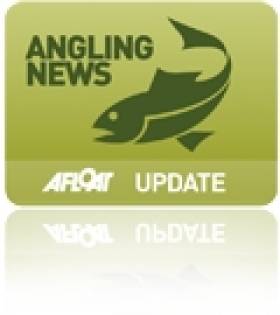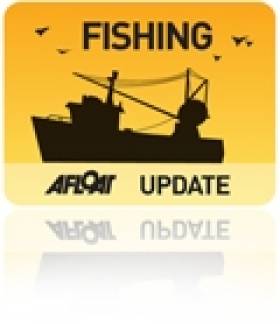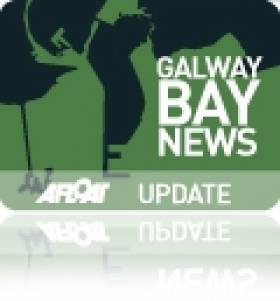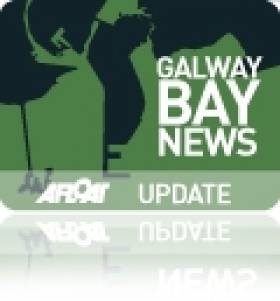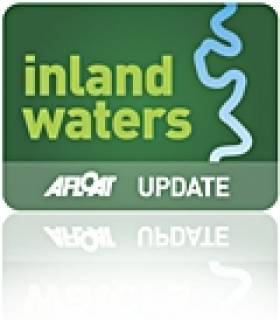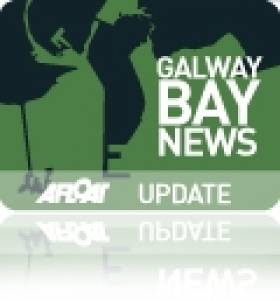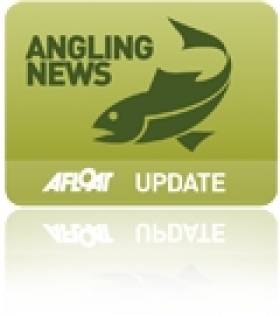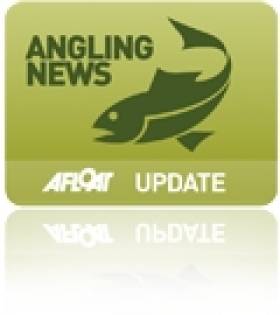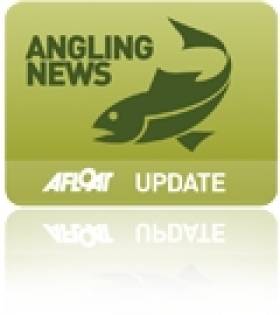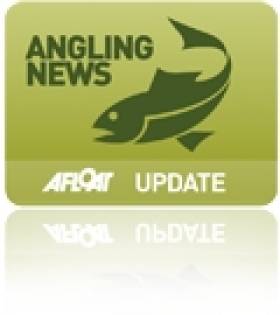Displaying items by tag: IFI
IFI Launches 2013 Angling Sponsorship and Salmon Conservation Schemes
#ANGLING - The Inland Fisheries Ireland (IFI) annual Sponsorship Scheme for 2013 is now open for applications.
There are some changes to the scheme for 2013, with biosecurity and catch and release conditions "safeguarding Ireland’s wonderful inland fisheries and sea angling resources".
Prizes may be sponsored under the scheme, but must be fishing tackle or angling-related in order to support those providing a service to Ireland's estimated 500,000 anglers.
The scheme is open to federations, clubs, individuals, youth groups, commercial salmon sector, etc who in the past have gained sponsorship for competitions, angling lessons, heritage projects and international, national and local events, all of which promote some or all of the following: inland fisheries, recreational angling and conservation.
Minister Fergus O'Dowd welcomed the scheme, saying: “Angling, and Ireland’s wonderful fisheries are there for all to enjoy. IFI, by supporting such activity is empowering individuals and organisations to boost their local economies, teach all ages and abilities to fish, have a hobby for life, and helping protect and sustain our fisheries resource into the future.”
Full details of the scheme are available on the IFI website and the closing date for receipt of applications is 15 January 2013.
Meanwhile, Minister O'Dowd has also announced the opening of the 2012-13 Salmon Conservation Fund Contributors Scheme, which has an initial allocation of €200,000 available for projects which help in the conservation of wild Atlantic salmon.
Applications are invited from clubs, fishery owners, individuals and commercial salmon fishermen who have contributed to the fund by 15 March 2013.
According to IFI, the scheme - which was run on a pilot basis for the previous two years - has been a success to date, with projects from all over Ireland awarded funding.
Applicants work with IFI to agree projects and many have been successful in securing additional LEADER funding.
The minister commented: “I never cease to be impressed by the work enthusiastic, passionate anglers and individuals can get done, ensuring that our natural resource is conserved and protected for future generations.
"The long term effect will ensure biodiversity and improved stocks of salmon from which Ireland can derive economic benefit through recreational angling, and commercial exploitation in years to come.”
Details of the scheme can be downloaded from the IFI website HERE.
BIM to Hold Public Tender for Galway Bay Fish Farm
#FISHFARM - Bord Iascaigh Mhara (BIM) is set to hold a public tender process for the development of the proposed deep sea fish farm in Galway Bay, according to The Irish Times.
Financiers around the world have expressed interest in the 500-hectare organic salmon farm to be located off Inis Oirr in the Aran Islands, though BIM said it was not at liberty to disclose who they are.
As previously reported on Afloat.ie, the proposed fish farm would be the largest of its kind in Europe, set to double the State's production of organic salmon.
BIM says it is already receiving inquiries for jobs from emigrants wishing to return home.
However the scheme has faced opposition from Inland Fisheries Ireland (IFI) and local anglers, who cite the potential threat to wild salmon numbers in the area.
IFI recently issued a statement regarding its submission on the project's Environmental Impact Statement, raising concerns about the scale of the development and the impact of sea lice - infestations of which are often concentrated by aquaculture.
The public consultation that began in mid-October is scheduled to conclude next Wednesday 12 December.
Angling Writer 'Deeply Concerned' Over Aran Islands Fish Farm Plans
#GALWAY FISH FARM - In his latest angling column for The Irish Times, Derek Evans writes of his 'deep concern' over the proposed deep sea salmon farm off the Aran Islands in Galway Bay.
Making reference to new research that shows infestations of sea lice - which often concentrate in fish farms - pose a significant threat to the survival of wild salmon fisheries, as previously reported on Afloat.ie, Evans writes that the "untold damage" from such infestations would be "nothing short of catastrophic".
He adds: "While this latest proposal is a step in the right direction in terms of its 'off-shore' location, nevertheless, it will bring a plethora of problems, beginning with the size of its annual output and the 'baggage' that entails if and when it moves into unchartered waters."
Evans also points to the submission on the Environmental Impact Statement (EIS) made by Inland Fisheries Ireland (IFI), which includes "an additional checklist for consideration including the location and dimension of this proposed farm; site characteristics; production process; potential impacts; monitoring; and organic farming", as well as suggesting an assessment of all wild salmon fisheries in the affected area, plus a full monitoring system and baseline study.
Evan's comments come in the wake of IFI's dispute with Bord Iascaigh Mhara over the exclusion from the statutory consultation of a report critical of the proposed salmon farm off Inis Óirr, which has faced opposition from local salmon anglers.
The Irish Times has much more on the story HERE.
IFI Board Issues Statement on Galway Bay Fish Farm
#GALWAY FISH FARM - The board of Inland Fisheries Ireland (IFI) has issued a statement on the proposed Aran Islands deep sea salmon farm in Galway Bay, which has been the source of some controversy in recent weeks.
The board said it agrees with the recent statement by Minister Fergus O’Dowd on offshore salmon farming, and that it welcomes the development of Ireland’s aquaculture sector "once any development complies with Ireland’s obligations under relevant EU environmental legislation, particularly the Habitats Directive, and does not adversely affect salmon and sea trout stocks."
In addition, the IFI board said it has made a submission on the Environmental Impact Statement (EIS) prepared by Bord Iascaigh Mhara (BIM) for the proposed offshore salmon farm as part of the public consultation process, which is available on the IFI website.
As previously reported on Afloat.ie, the public consultation period began last month for the 500-hectare organic fish farm to be located off Inis Oirr. BIM has applied for a deep sea salmon farming licence at the site, which would be one of the largest of its kind in Europe. If approved, the operation could more than double Ireland's current farmed salmon production rate.
The IFI board's statement notes: "In the submission, concerns were raised in relation to the location and scale of the proposed salmon farm and how its development and operation could impact on wild salmon and sea trout stocks and their habitat.
"These concerns are based on scientific reports by respected authors and knowledge of the impact of existing fish farms on salmon and sea trout populations off the west coast of Ireland."
The submission also highlights "recent peer reviewed international scientific literature on the impacts of sea lice on salmonids" which poses a significant threat to wild salmon in Irish waters, as reported on Afloat.ie.
The board said it does not believe "that the corpus of peer reviewed international scientific literature which recognises the negative impacts of sea lice on salmonids have been adequately dealt with in the EIS".
While welcoming "any sustainable initiative which will provide jobs in rural coastal communities", the IFI board said it questions the figure of 500 jobs it's been reported the 15,000-tonne fish farm project would create, making comparison to a new 2,000-tonne aquaculture scheme in Scotland that's expected to create just four full-time positions.
The board members say they "have serious concerns that whatever the number of jobs created by the current proposal, they will be more than offset by the associated loss of jobs in the recreational angling and tourism sectors" if the scheme results in any negative effects on those areas.
"Ireland's reputation as a pristine wild fishery destination must be safeguarded," they added, noting that proposals for two further offshore salmon farms in Mayo and Donegal "are premature given that significant issues over the current proposal have not yet been resolved.
"No further applications should be progressed until all stakeholders are satisfied that the current proposal is sustainable and has no adverse impact on wild salmon and sea trout stocks."
Inland Fisheries Ireland is the State agency charged with the conservation, protection, development management and promotion of Ireland's inland fisheries and sea angling resource.
Sea Lice Pose Significant Threat to Wild Salmon Says New Research
#ATLANTIC SALMON - About 39% of salmon mortalities were attributable to the impact of sea lice on wild salmon fisheries, according to a new international study.
The research, published in Proceedings of the Royal Society B, involved experts from Inland Fisheries Ireland collaborating with the Scottish Oceans Institute at the University of St Andrews, the Department of Zoology at the University of Otago in New Zealand, the Atlantic Veterinary College at the University of Prince Edward Island in Canada and the Institute of Marine Research in Norway.
In a statement on the report, IFI says: "In previously published studies, groups of salmon smolts were treated to protect them against sea lice infestation and other groups were untreated and both groups released to sea into 10 areas of Ireland and Norway. A proportion of these released fish were recaptured as adult salmon one or more years later.
"Analysis of the results of all previously published studies together provide experimental evidence from a large marine ecosystem that sea lice can have large impacts on salmon recruitment, fisheries, and conservation. The sea lice were likely acquired during early marine migration in areas with salmon farming, which elevate local abundances of sea lice."
IFI says the results "indicate that parasite-associated mortality may cause the closure of some fisheries when conservation targets of return adult abundances are not being met. However, the implications of these results may be most serious for small populations in small river systems."
The inland fisheries body explains that the high natural mortality rate of both treated and untreated salmon groups was accounted for, which revealed "a large effect of parasites".
"Precisely because natural mortality rates are high, even a proportionally small additive mortality from parasites can amount to a large loss in adult salmon recruitment," it adds.
Minister of State for Natural Resources Fergus O'Dowd welcomed the report, stating: “From the results of this detailed study, it is crucial that sea lice levels are maintained below [designated] protocol levels, particularly in spring when wild salmon smolts are migrating to sea to avoid increased marine mortality.
Minister O'Dowd added that the results of this study "augment our knowledge in the context of proposals for aquaculture development".
The news comes in the wake of IFI's dispute with Bord Iascaigh Mhara over the exclusion of a report critical of the proposed new deep sea wild salmon farm in Galway Bay from the statutory consultation.
The scheme has faced opposition from local salmon anglers who fear the new facility would pose a threat to wild salmon stocks in Irish rivers by increasing the risk of sea lice infection.
BIM Brings Fish Farm Consultation to Aran Islands
#GALWAY FISH FARM - Galway Bay FM reports that a series of direct public consultations on the proposed Aran Islands fish farm in Galway Bay will begin this week.
Bord Iascaigh Mhara (BIM) is organising the meetings on the islands and in nearby Galway City to allow the public to view its proposals for what would be one of the largest aquaculture operations in Europe.
As previously reported on Afloat.ie, the public consultation period began last month for the 500-hectare organic fish farm to be located off Inis Oirr. BIM has applied for a deep sea salmon farming licence at the site some 6km off the island.
If approved, the operation could more than double Ireland's current farmed salmon production rate.
The scheme has faced opposition from local anglers and from Inland Fisheries Ireland, who claim it poses a risk to wild salmon stocks.
But BIM has condemned IFI's "stop everything" attitude regarding the fish farm proposals, while accusing environmental campaigners of being "deliberately alarmist", according to the Galway Independent.
Lobby group Friends of the Irish Environment entered a dispute with the sea fisheries board over the exclusion of an IFI report critical of the salmon farm from the statutory consultation.
“In the current climate, with jobs being as scarce as they are and economic development being the way it is, I think really that sort of attitude, that sort of museum curator ‘stop everything’ attitude is not good enough,” said BIM aquaculture development manager Donal Maguire.
Enniscorthy Anglers Reach Agreement Over Slaney Salmon
#ANGLING - Enniscorthy anglers have reached an agreement with Inland Fisheries Ireland (IFI) over the use of shrimp as bait to catch the Slaney's prized salmon, according to the Enniscorthy Guardian.
The Enniscorthy Local Anglers Association has also agreed with IFI officials not to overfish the river when levels are low.
New signage has now been installed along the river through the town reminding salmon anglers that no more than 15 rods will be allowed at any one time when the water is running low.
All fish must also be returned to the Slaney as per the agreement.
As previously reported on Afloat.ie, the Wexford town's anglers had secured the support of the IFI board in their call to prevent the threatened ban on using shrimp as bait.
Members of the Enniscorthy Local Anglers group argued that shrimp is ideal bait for catching salmon downstream, and said they were "baffled" by the ban on its use by IFI officials.
Pickings have been slim so far this season, with only one fish caught since it began a month ago. But local angler Kris Murphy is "generally optimistic" about the river's salmon stocks.
The Enniscorthy Guardian has more on the story HERE.
Draft Net Season Won't Be Brought Forward Says Minister
#ANGLING - Minister for Natural Resources Fergus O’Dowd has confirmed that there is no proposal for the extension of the salmon draft netting season.
In response to concerns expressed by the angling community and highlighted by Derek Evans in The Irish Times last week, Minister O’Dowd emphasised that conservation and management of salmon and sea trout is key to protecting our valuable natural resources.
“Recent reports that the commercial season will be extended in certain rivers are untrue and I can confirm that for the 2012 season, the commercial fishing season remains as it was in all areas, with the River Suir still on a reduced season for snap fishing," said the minister.
"I am aware that confusion can arise due to the necessary extent of regulations in place. However, I am not considering any proposal for the extension of the commercial season."
The minister reminded that Inland Fisheries Ireland is the body that enforces Ireland's "extensive" fisheries legislation.
"IFI has offices throughout the country where advice can be sought. There is also a comprehensive and regularly updated website and information is also disseminated on Facebook and Twitter," he said.
Meanwhile, IFI chief executive Dr Ciaran Byrne said that the legislative code is regularly updated to ensure that Ireland's fisheries continue to be protected on the basis of information from IFI’s Standing Scientific Committee and IFI management advice.
“Only rivers with exploitable surpluses are open during the spring season and no fishery is open for commercial exploitation during this time," said Dr Byrne. "Fisheries that are classified catch-and-release or closed for salmon are now protected under bye-law 897 which prohibits the use of worms and the use of any fish hooks other than single barbless hooks.
"IFI’s priorities are maximising the return to Ireland, protecting sustainable jobs in isolated rural communities and promoting our wonderful angling resources," he added.
Survey to Assess Value of Irish Angling
#ANGLING - Inland Fisheries Ireland (IFI) has appointed Tourism Development International (TDI) to undertake a Socio-Economic Survey of Recreational Angling in Ireland.
The overall objective of the survey, which will run over the course of 2012, is to establish the current volume and value of domestic and overseas recreational angling in the country.
Pike, coarse fish, bass, salmon, sea trout, brown trout and sea anglers will all be invited to participate in what is described as Ireland's most comprehensive angling survey undertaken in decades.
The survey will inform IFI and its tourism partners in relation to the business of angling in Ireland and also enable improved strategic planning and decision-making in terms of product development and marketing.
"Anglers are the key to this survey," commented Minister of State for Natural Resources Fergus O'Dowd. "They know the resource and they understand the importance of sustainability. What anglers contribute to Ireland’s economy is unknown but I am certain that it is significant.
"Angling takes place in every river and lake in Ireland and all around our coastline. There is no town or village in Ireland that doesn’t have anglers."
He added: "It is imperative that the inland fisheries and sea angling resources are managed in the best way possible to ensure enjoyment for our local and visiting anglers, sustainable jobs in rural communities and maximising its potential to add to Ireland’s economy.
"Getting the right information from those most involved will greatly assist in improving the angling product."
The survey comprises two parts: a household survey and a survey of recreational anglers which will commence in April. Anglers will be met at fishing locations throughout Ireland and invited to participate there and then, or later by phone or online. IFI says that every effort will be made to accommodate participation.
- angling
- Inland Fisheries Ireland
- IFI
- Tourism Development International
- TDI
- survey
- SocioEconomic Survey of Recreational Angling in Ireland
- Pike
- Salmon
- Sea Trout
- brown trout
- coarse angling
- sea angling
- tourism
- business
- marketing
- development
- Minister of State for Natural Resources
- Fergus O'Dowd
- sustainability
- inland waterways
- jobs
New Angling Guide for Lough O'Flynn and Upper Suck
#INLAND WATERWAYS - Inland Fisheries Ireland (IFI) officially launched the Lough O’Flynn and Upper Suck Angling Guide at the Old Stonehouse Restaurant in Ballinlough recently.
The guide opens to Lough O'Flynn, a 300-acre limestone lake situated 2km from Ballinlough and one of IFI’s many managed lakes requiring a permit.
This lake holds a stock of wild brown trout and is also stocked with brown trout each year which provides an excellent opportunity for all kinds of anglers and those wishing to take up the sport to learn how to fish for trout.
Meanwhile, the centrefold of the guide showcases the Upper Suck catchment from Lough O’Flynn through Co Roscommon and Galway until the Shiven tributary joins, along which good quality coarse, pike and trout angling can be expected.
With breathtaking scenery, this is the perfect place for anglers who can fish almost undisturbed from dawn till dusk.
There are also a considerable number of sections dedicated to anglers with disabilities, such as the Donamon angling stretch which has 30 fishing stands available with individual car parking bays and toilet facilities. This section has proven extremely popular, and IFI says it is committed to ensuring that sections like Donamon continue to open fishing up for everyone.
Amanda Mooney, director at IFI, said: “The guide offers a great source of information on angling hotspots for various types of species, access points and facilities, legislation and safety.
"All in all everything you need for planning a fishing trip. The guide and angling promotion in general supports local businesses and communities in sustaining jobs.”
The Lough O’Flynn and Upper Suck Angling Guide is available from IFI outlets and local permit agents in Ballinlough, Co Roscommon.
Inland Fisheries Ireland also marked the retirement of John Ryan, assistant inspector for Lough O’Flynn and the Suck catchment, after 41 years of service.
Ryan was involved in many areas and aspects of fisheries throughout his career, and was particularly noted for his positive engagement with various groups from angling clubs and development associations to local authorities, businesses and communities.



























